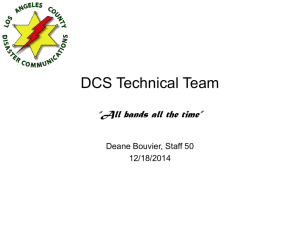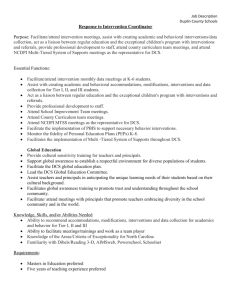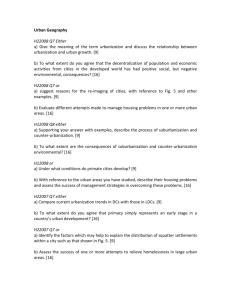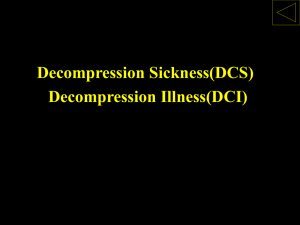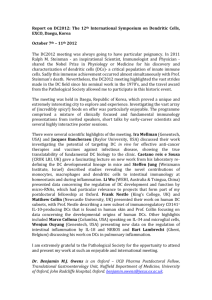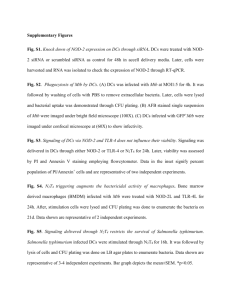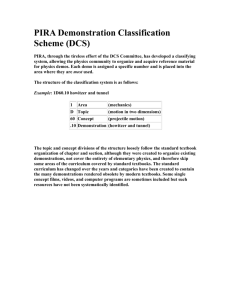18 Credit Hours 2 Years Maximum Credit 3-13 Hours Coursework;
advertisement
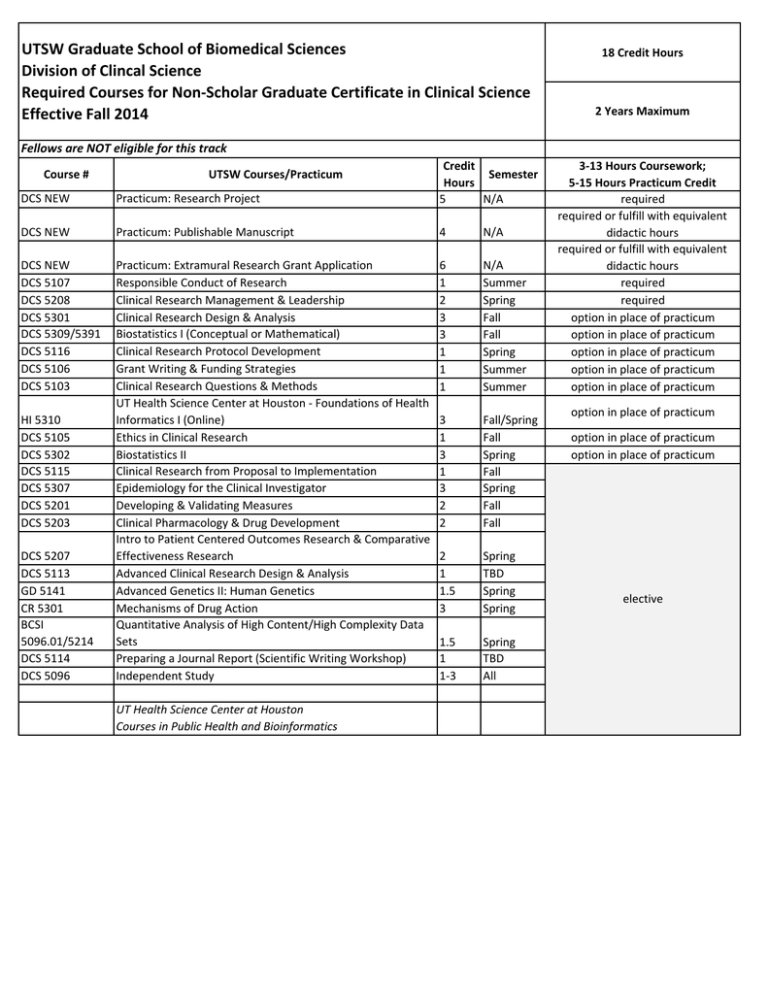
UTSW Graduate School of Biomedical Sciences Division of Clincal Science Required Courses for Non-Scholar Graduate Certificate in Clinical Science Effective Fall 2014 18 Credit Hours 2 Years Maximum Fellows are NOT eligible for this track DCS NEW Practicum: Research Project Credit Semester Hours 5 N/A DCS NEW Practicum: Publishable Manuscript 4 N/A DCS NEW DCS 5107 DCS 5208 DCS 5301 DCS 5309/5391 DCS 5116 DCS 5106 DCS 5103 Practicum: Extramural Research Grant Application Responsible Conduct of Research Clinical Research Management & Leadership Clinical Research Design & Analysis Biostatistics I (Conceptual or Mathematical) Clinical Research Protocol Development Grant Writing & Funding Strategies Clinical Research Questions & Methods UT Health Science Center at Houston - Foundations of Health Informatics I (Online) Ethics in Clinical Research Biostatistics II Clinical Research from Proposal to Implementation Epidemiology for the Clinical Investigator Developing & Validating Measures Clinical Pharmacology & Drug Development Intro to Patient Centered Outcomes Research & Comparative Effectiveness Research Advanced Clinical Research Design & Analysis Advanced Genetics II: Human Genetics Mechanisms of Drug Action Quantitative Analysis of High Content/High Complexity Data Sets Preparing a Journal Report (Scientific Writing Workshop) Independent Study 6 1 2 3 3 1 1 1 N/A Summer Spring Fall Fall Spring Summer Summer 3 1 3 1 3 2 2 Fall/Spring Fall Spring Fall Spring Fall Fall 2 1 1.5 3 Spring TBD Spring Spring 1.5 1 1-3 Spring TBD All Course # HI 5310 DCS 5105 DCS 5302 DCS 5115 DCS 5307 DCS 5201 DCS 5203 DCS 5207 DCS 5113 GD 5141 CR 5301 BCSI 5096.01/5214 DCS 5114 DCS 5096 UTSW Courses/Practicum UT Health Science Center at Houston Courses in Public Health and Bioinformatics 3-13 Hours Coursework; 5-15 Hours Practicum Credit required required or fulfill with equivalent didactic hours required or fulfill with equivalent didactic hours required required option in place of practicum option in place of practicum option in place of practicum option in place of practicum option in place of practicum option in place of practicum option in place of practicum option in place of practicum elective Course Course Name # Summer Courses DCS Clinical Research 5103 Questions & Methods CORE Credit Hours Course Description 1 Defining and developing a research question; distinguishing between correlative and mechanistic questions, matching methods to questions, understanding bias and confounding, random and systemic error, quantifying clinical information. DCS 5106 Grant Writing & Funding Strategies CORE 1 This course will review the different types of federal grant mechanisms as well as grants or contracts from research foundations, advocacy organizations and industry. How to write a persuasive, well-reasoned application will be the focus of the course including the budget, resources and environment, preliminary data, and the research plan. DCS 5107 Responsible Conduct of Research CORE 1 Regulatory requirements of clinical research (IRB, GCP, HIPAA, and investigational filings), ensuring patient safety, interactions with government and industry, contract negotiations, successful strategies and tactics. 1 Introduction to ethical reasoning and related processes, techniques of settling disagreements among people, treatment versus research, informed consent, clinical research relevant to third parties, dealing with unexpected scientific and clinically important findings, getting what you want from mentors, consent and risk issues with unproven biological markers, conflicts of interest/duty, handling misconduct and fraud, ethics of subject recruitment, compensating for injuries or medical errors in research, talking to media, public policy advising, authorship order and publications, gender and ethnicity in sciences careers. Fall Courses DCS Ethics in Clinical Science 5105 DCS 5391 Mathematical Biostatistics for the Clinical Investigator CORE 3 Traditional, mathematical approach to statistical analysis of biomedical data. Topics include data description, summary statistics, elements of probability, distributions of random variables including applications of the binomial and normal distributions, estimation and confidence intervals, hypothesis testing, analysis of variance, correlation and regression and contingency tables. Additional topics include statistical power, sample size, and study design. DCS 5309 Conceptual Biostatistics for the Clinical Investigator CORE 3 Conceptual approach to statistical analysis of biomedical data. Review of fundamental statistical principles focusing on explanation of the appropriate scientific interpretation of statistical tests rather than the mathematical calculation of the tests themselves. The course covers All topics typically used in biomedical publications, including data description, summary statistics, p values, and non-parametric tests, analysis of variance, correlation, regression, and statistical power & sample size estimation. DCS 5301 Clinical Research Design & Analysis CORE 3 Basic and intermediate level principles in research design; formulation of the research question; identifying primary and secondary structures; use of control groups and pre-specified hypotheses; surrogate measurements; analysis of incomplete data; meaning of P values and confidence intervals; identification of bias and flaws in study design. DCS 5115 Clinical Research from Proposal to Implementation 1 This course reviews basic elements for a research proposal and implementation. Topics include regulatory approvals; continuing regulatory oversight; monitoring patient safety; recruitment; clinical assessments, data treatment, data collection, entry and auditing; provision of experimental tests/tasks; data analyses; publication planning. DCS 5201 Developing & Validating Measures in Clinical Research 2 This course concerns principles of creating, evaluating and validating instruments and scales for the quantification of human responses and clinical events and the influence and interaction of physiological and behavioral factors. Students will engage in some data analysis so that they can better interact with psychometric specialists. Much of this course necessarily deals with statistics, but the stress is on practical considerations of constructing measures. Emphasis is given to what is generally known as “quality of life” measures. Much of the course involves the basics of factor analysis, which is essential to the analysis of scales. DCS 5203 Clinical Pharmacology & Drug Development 2 Pharmacokinetics; pharmacodynamics; drug absorption, distribution, metabolism/elimination; drug-drug and drug-disease interactions; preclinical drug development (Phase I, II, III and IV); proof-of-concept and dose-finding studies; post-marketing surveillance. HI 5310 UT Health Science Center at Houston - Foundations of Health Informatics I (Online) CORE 3 Foundations of Health Informatics I is designed to provide an overview of current issues and future challenges in the field of health information sciences. At the end of the course, students will be able to: Apply the thought processes of health informatics to real world problems; discuss the advantages and disadvantages of using information technology in healthcare; discuss the role of data, information, and knowledge in modern healthcare; read and discuss the contemporary informatics scientific literature. 2 This course covers the methods used in outcomes and health services research, which includes research design, theory, measurement, methods of analysis and evaluation of published research. Course objectives are: 1) describe basic concepts, definitions, and types of outcomes and health services research; 2) understand structure, process, outcomes and underuse, misuse, overuse conceptual models; 3) identify common approaches and challenges to measuring cost, quality, access, and equity in health and health care; 4) describe experimental and observational research designs used to assess the impact of health services (drugs, devices, procedures, strategies, delivery and financing systems) on patient-oriented, clinical, and resource use outcomes. Spring Courses DCS Introduction to Patient 5207 Centered Outcomes Research & Comparative Effectiveness Research DCS 5302 Biostatistics for Clinical Sciences II 3 Linear and logistic regression models (control of confounding and predictive models); categorical data analysis (binomial and Poisson distributions, analysis of paired categorical data, nonparametric methods for ordinal data); survival analysis (Kaplan-Meier curves. Hazard functions, types of censoring, log-rank tests and generalized Wilcoxon tests, Cox regression model). DCS 5116 Clinical Research Protocol Development CORE 1 Practical aspects of research protocol conceptualization and development. Enrollees will learn how to translate a research question into a hypothesis; how to identify and describe hypothesis appropriate study subjects and study measurements; select a specific study design appropriate to the research question and resources available; synthesize the elements into a study plan; develop a statistical section and analytical plan. Protocols developed by the enrollees will form the primary basis for group discussions. DCS 5307 Epidemiology for the Clinical Investigator 3 Concepts of multivariate causality; criteria for establishing causality; risk; rates; incidence, prevalence and attack rates; incidence density; crude, specific and adjusted rates; relative risk, odds ratio, case-fatality rate and attributable risk; sampling error, selection bias, information bias, definition bias, and confounding; statistical techniques to control for bias; variables; overview of statistical analysis; multiple comparisons correction; study designs to avoid bias: survey and sample selection, cross-sectional, cohort, case-control; prospective vs. retrospective; attributes of cohort studies; design principles of case-control studies; types of control groups; strategies of matching in case-control studies; experiential introduction to statistical computing for different types of clinical epidemiology studies. DCS 5208 Clinical Research Management & Leadership CORE 2 This course is a structured review and discussion of the basics of management and leadership theory and practice. Topics include project management and budgeting, information systems, leadership style, effective interviewing and hiring techniques, conflict resolution, and the basics of organizational culture. Predominant theories and research, as well as shared experiences of the instructor and the group will be discussed in order to enhance each participant’s effectiveness as a manager and leader. It will be a combination of assigned readings, didactic lectures, active group discussion, a mid-term project and final examination. BCSI 5096.0 1/ 5214 Quantitative Analysis of High Content/High Complexity Data Sets 1.5 Second half of spring semester. The goal of this course is to teach students about how high content / high complexity data sets are generated and analyzed to extract information, and how the information is analyzed and integrated to generate knowledge. The course will begin with an overview of the types of high content data sets generated from a variety of discovery platforms (i.e., genomics, proteomics, metabolomics, imaging, structure), the information they include, and their architecture. This will be followed by series of lectures on data preprocessing (focusing on quality control and reproducibility) and the basics of high content data set analyses. This introductory material will be followed by a series of lectures exemplifying the types of data and analyses associated with the various discovery platforms. The course will conclude with a series of lectures on specific approaches to data analysis and integration. During the course, the students will be exposed to programming languages, such as R and its statistical packages, as well as a variety of bioinformatic tools that are available on the internet. The course material will include theoretical and conceptual, as well as practical and applied, presentations. GD 5141 Advanced Genetics II: Human Genetics 1.5 Second half of spring semester. The course introduces students to the conceptual basis of human genetics research. Some of the classes review basic principles of medical genetics, since many students do not have any prior exposure to this subject, but discussions emphasize research applications rather than clinical problems. Topics include discovering the molecular basis of Mendelian disorders and complex traits through molecular cytogenetics, genetic linkage, and candidate gene and genomewide association methods. Discussion of research papers drawn from the current literature is used to illustrate each of these approaches. CR 5301 Mechanisms of Drug Action 3 The course is designed to cover a broad range of topics from fundamental principles in drug action to commercial applications. We start by examining how drugs interact with their receptors to induce their effects. We will discuss allosteric regulation, receptor desensitization and intracellular trafficking, and biophysical methods to analyze drug-receptor interactions. We then review how drugs enter, distribute and become eliminated from the body and the mathematical analysis of their pharmacokinetics, as well as the development of drug tolerance and dependence. Next, we learn the principles underlying the action of a few selected classes of drugs and receptors. The second half of the course deals with specialized topics, including drugs used in psychiatry and drugs of abuse, in the chemotherapy of bacterial and virus infections, and in the treatment of parasitic diseases and the problems of developing drugs for Third World countries. We go on to discuss drugs affecting cholesterol homeostasis, prostaglandins and leukotriene pharmaceuticals, and the basis of drug interactions. We discuss emerging cancer therapeutics (antibodies, RNA, DNA, gene therapy, nanoparticles). The final lecture concerns the process of drug development in the pharmaceutical industry and the scientific and commercial complexities of getting the drug from the laboratory to the bedside. HI 5310 UT Health Science Center at Houston - Foundations of Health Informatics I (Online) CORE Semester Varies DCS Preparing a Journal Report 5114 DCS 5113 DCS 5096 Other Advanced Clinical Research Design & Analysis Independent Study/Special Topics Online courses offered through the University of Texas Health Science Center at Houston. 3 Foundations of Health Informatics I is designed to provide an overview of current issues and future challenges in the field of health information sciences. At the end of the course, students will be able to: Apply the thought processes of health informatics to real world problems; discuss the advantages and disadvantages of using information technology in healthcare; discuss the role of data, information, and knowledge in modern healthcare; read and discuss the contemporary informatics scientific literature. 1 General writing skills and strategies; how to prepare an empirical article including tips on writing the abstract, introduction, aims, methods, results, and discussion/conclusion sections of a peer reviewed journal article. Students will be required to submit a journal article and review others' articles. 1 By the end of the course, students will be able to critically review and critique the methods of scientific journal articles pertinent to academic medicine. 1-3 Courses offered through the School of Public Health in the division of Health Promotion & Behavioral Sciences Courses offered through the School of Biomedical Informatics

